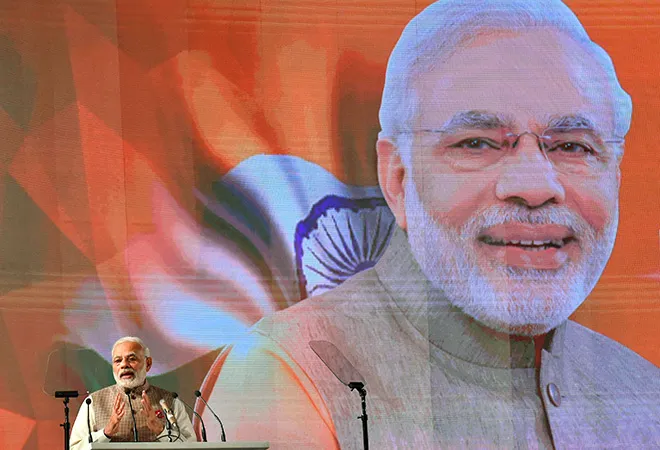
After a close fight, the Bharatiya Janata Party (BJP) has retained Gujarat, winning the Assembly elections for the sixth time in row. It has also wrested Himachal Pradesh from the Congress.
Despite these victories of the BJP, a closer look at the results, notwithstanding the tall claims of its leadership, presents a contrary picture of a setback to its domination.
Gujarat has provided a psychological victory for the Congress, while it is a moral defeat for the BJP though it has been able to form the government. The situation could have been different but for Prime Minister Narendra Modi’s relentless campaign in the last two weeks.
The electoral contest in Gujarat has proved that the BJP’s promise of making the country free of the Congress (Congress Mukt Bharat) is a tall claim only to lead people the garden path. The new Congress President Rahul Gandhi has demonstrated that he is ready to take on the BJP.
Read | Time ripe for Rahul to take over, but arduous journey ahead
Gandhi has presented a new narrative of fighting hatred with love and negativity with positivity by a decent political discourse during the long electoral campaign in the western state. “My Congress brothers and sisters, you have made me very proud. You are different than those you fought because you fought anger with dignity,” he said in his post-results tweet.
While the BJP sweeping the Himachal was a done thing, because power has been rotating between the Congress and the BJP every five years, the BJP’s performance in Gujarat, where its tally went down below the psychological 100, after losing 16 seats from its 2012 tally, is a setback or an alarm signal to the ruling party.
The defeat of the Congress in Himachal was a foregone conclusion, as it was not only suffering from anti-incumbency but also from a seriously dented public image of Chief Minister Virbhadra Singh following cases of corruption. The Congress also suffered from factionalism. Moreover, Virbhadra Singh had not allowed second line of leadership to emerge in the party and this too contributed to the party’s loss.
Let us look at the Gujarat closely. BJP president Amit Shah had set the objective of winning 150 plus seats but the final tally is even below that of the 2012 assembly elections. The BJP had won 116 seats five years back. Even this victory has come after Prime Minister Modi addressing 37 rallies and Shah clocking 43 public meetings. As many as 30 central ministers, BJP chief ministers, 14 newly elected UP mayors, RSS leaders and thousands of Sangh pracharaks were deployed in the state. Still the final figure is just seven seats above the halfway mark.
In fact, the BJP top leadership did not want to leave anything to chance and that is why it had ensured that former state Chief Minister Shankar Sinh Vaghela rebelled so that the electoral prospect of its main opponent could be undermined. He had left the Congress along with 14 MLAs owing loyalty to him. Vaghela fielded candidates at over 105 assembly seats to divide the opposition votes, but the electorate saw through the BJP game and his candidates failed to win a single seat with all of them losing even deposits.
The BJP leadership was worried from the beginning. So, first it managed to delay the elections by nearly a month (it was supposed to be held along with Himachal Pradesh) through the Election Commission. Then the winter session of Parliament was postponed to help the Prime Minister and other ministers find time to spend in Gujarat. Towards the end, Modi went to the extent of accusing country’s former Prime Minister, former Vice President, former Chief of the Army Staff and three of former High Commissioners to Pakistan of hatching a conspiracy to end the BJP rule. Political discourse in Gujarat went down below as it became atrocious, toxic and abusive.
Read | Will Modi’s magic band work again in Gujarat?
Despite all these, not only has the final tally of the BJP came down, but also its percentage of popular votes, compared to the 2014 Lok Sabha elections, came down, though it successfully managed to maintain its popular vote percentage of 2012 assembly elections or slightly improved upon it. If one went by the Lok Sabha results, the BJP should have won by at least 160 seats.
By stating that “a victory is a victory,” the BJP has tried to hide its failure and throw a cover on its below than expected results in Gujarat. The BJP president attributed the reduction in number of seats in Gujarat to bringing down of the political discourse and use of caste by the Congress.
The claim of the BJP and the RSS that the Congress could improve its electoral tally by aligning with Hardik Patel, Jignesh Mewani and Alpesh Thakore does not seem to stand out scrutiny, as every opposition party would try to exploit the ruling party’s weaknesses. There is no doubt that these youth leaders were the product of social unrest that was the result of the state government’s mishandling of protest movements. In fact, credit goes to the Congress for tapping the anger of the three youth leaders so that their frustrations could be honed into positive energies for democratic dividends. Electoral victories of Mewani and Thakore have proved that the BJP’s claim that the Congress used caste is not correct.
The BJP has won majority of the urban seats while the Congress' victories have come from the rural constituencies, underlining the growing urban-rural divide. The BJP has won over 87 percent of the seats in Ahmedabad, Surat, Rajkot and Vadodara. Both the Congress and the BJP have improved upon their respective polled votes with the former receiving 3.5 percent more votes than in 2012 and the latter getting 1.2 percent more.
The BJP has won majority of the urban seats while the Congress' victories have come from the rural constituencies, underlining the growing urban-rural divide.
Though the Congress lost both Himachal and Gujarat, the country’s grand old party has reemerged as a powerful factor from its worst ever electoral performance in the 2014 Lok Sabha elections.
In both the states, third parties have lost out, thus shrinking the political space for non-BJP and non-Congress parties.
Other important message is that the newly elected Congress president, Rahul Gandhi, who led a spirited campaign in Gujarat, has established himself as a leader. There is no doubt that the Congress will give a credible fight in the coming Assembly elections next year — eight states, including the BJP ruled Madhya Pradesh, Rajasthan and Chhattisgarh, leading to the Lok Sabha elections in 2019.
Rahul Gandhi has succeeded in setting the agenda for the Prime Minister. The Congress president forced Modi to go on offensive by rattling the BJP leadership by his temple visits, reclaiming a territory that it had totally lost to the RSS-BJP since the Ram temple movement in Ayodhya.
The RSS-BJP had dubbed the Congress as an anti-Hindu party. But through his campaign in Gujarat, Rahul Gandhi has made the necessary course correction, taking the fight to the BJP camp. He has successfully presented a new narrative that the real contest is between a good Hindu who stands for equal respect for all religions and a bad Hindu who only talks of one religion and sees with contempt other faiths.
The Congress' performance in Gujarat is expected to attract new blood to the party.
The outcome of the electoral results in Gujarat has dented the invincible image of the Prime Minister that in turn would give boost to opposition parties in coming elections. This is going to impact national politics in a major way.
The views expressed above belong to the author(s). ORF research and analyses now available on Telegram! Click here to access our curated content — blogs, longforms and interviews.




 PREV
PREV


